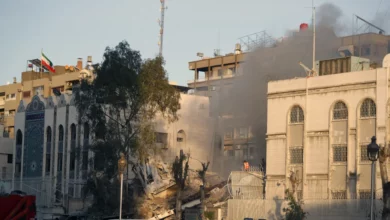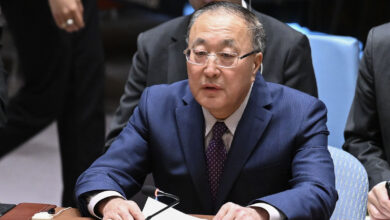In its 59th Facebook communiqué, the ruling Supreme Council for the Armed Forces (SCAF) tried to quell fears that it has designs for a long-term sojourn as the executive power in the land.
State-run Al-Ahram, in what was perhaps a journalistic Freudian slip, headlines the story by quoting the SCAF saying, “We will not allow anyone to usurp authority.” The ill-advised headline, in context, refers to a part of SCAF’s statement in which it intends to say that it would not allow anyone to hijack authority. Al-Ahram’s state-run kin Al-Akhbar rectified this mistake by adding, “without the authorization of the people.”
The real headline from the Facebook “pic” was, as Al-Wafd party’s eponymous newspaper (and others) put it, the SCAF saying, “We have not, and will not, hijack power.” The rest of the communiqué contained language meant to subdue fears that it is either planning to keep hold of its power or partial to certain groups gaining power over others.
Most papers also report on yesterday's release of a new draft law regulating parliamentary elections. This marks the first time since assuming power that the SCAF sets out a proposal for open discussion before issuing it as a decree (or law).
Independent Al-Shorouk says the law was put forth to the media and political parties to get a general sense of public opinion toward it from the discourse it would generate. The draft law’s main article proposes that a certain percentage of parliamentary seats be voted on proportionally through the parties (list-based candidacy) and that the rest are ballots for individuals who would be directly elected (the single-winner system).
But the government-sanctioned National Accord Conference will, according to Al-Akhbar, continue behind closed doors, putting forth other proposals for the elections system, including decreasing the electoral districts, and the sanctioned candidacy age.
Al-Ahram says the law would maintain a much-discussed 50 percent quota of representatives for laborers and peasants. It also publishes many different opinions regarding the list-based candidacy versus single-winner systems, both sides taking into account the viability of the systems given the current political instability.
Mohamed al-Agaty, head of the Supreme Administrative Court, ruled yesterday against a Mubarak-era law allowing sovereign or executive entities from independently selling government land. Al-Wafd says the ruling is mainly to keep individual executive entities, such as ministries, from immediately cashing in on sold land to increase transparency and make sure the money goes through the correct public channels to contribute to overall public spending.
In terms of corruption cases, the independent Al-Dostour and others say that former Interior Minister Habib al-Adly’s wife Ilham Sharshar is facing the Illicit Gains Authority. It is looking into all of the property that her incarcerated husband allegedly put in her name as a money laundering scheme.
Her session apparently caused the postponement of Alaa and Gamal Mubarak’s, since their shared lawyer had to deal with Sharshar’s affairs.
Saudi Arabia’s Prince al-Waleed bin Talal is apparently complaining again about the limitation of the land the government gave or sold to him in Toshka. Al-Wafd says he will resort to international arbitration.
Justice Minister Mohamed al-Guindy features heavily in the news today due to statements he made yesterday. Al-Dostour quotes him as saying that that Hosni Mubarak cannot be legally tried on political corruption charges. Al-Akhbar quotes him as calling for an end to the “million-man” demonstrations to focus on pushing the country forward. He also said that the Constitution should have been declared null and void the moment the SCAF assumed power. In Al-Ahram, Guindy says that the parliamentary elections should be postponed to allow for a more robust political process.
Al-Shorouk claims that the Muslim Brotherhood did a secret inventory of its members, and they have over 800,000. Al-Wafd claims that the Brotherhood decided to withdraw from the 25 January Revolution Youth Coalition due to its objection to the 27 May demonstrations.
The Rafah border, now apparently open after a prolonged siege of Gaza, was full of Palestinians on each side trying to cross. Al-Ahram says Field Marshal Hussein Tantawi is currently in talks with Palestinian President Mahmoud Abbas about possible reconciliation talks with Hamas.
It seems that the brutal dictators of the Arab world compete on how brutal and inhumane they can get. Most recently, Syrian security forces tortured to death a 13-year-old boy, Hamza al-Khateeb, for joining anti-government protests. Al-Shorouk says a Facebook page called “We are all Hamza al-Khateeb” was posted yesterday to galvanize public opinion (similar to Khaled Saeed) against those capable of such an act.
Al-Ahram reports on a meeting between an Egyptian delegation and the chair of the Iranian National Security Committee. The meeting was meant to mend the damage done by the expulsion of an Iranian diplomat in Cairo charged with espionage.
Al-Ahram and Al-Shorouk say that the Ministry of Education is implementing strict measures to ensure the integrity of the coming student exams, the first semester exams since the revolution.
Egypt's papers:
Al-Ahram: Daily, state-run, largest distribution in Egypt
Al-Akhbar: Daily, state-run, second to Al-Ahram in institutional size
Al-Gomhurriya: Daily, state-run
Rose al-Youssef: Daily, state-run
Al-Dostour: Daily, privately owned
Al-Shorouk: Daily, privately owned
Al-Wafd: Daily, published by the liberal Wafd Party
Al-Arabi: Weekly, published by the Arab Nasserist party
Youm7: Weekly, privately owned
Sawt al-Umma: Weekly, privately owned




